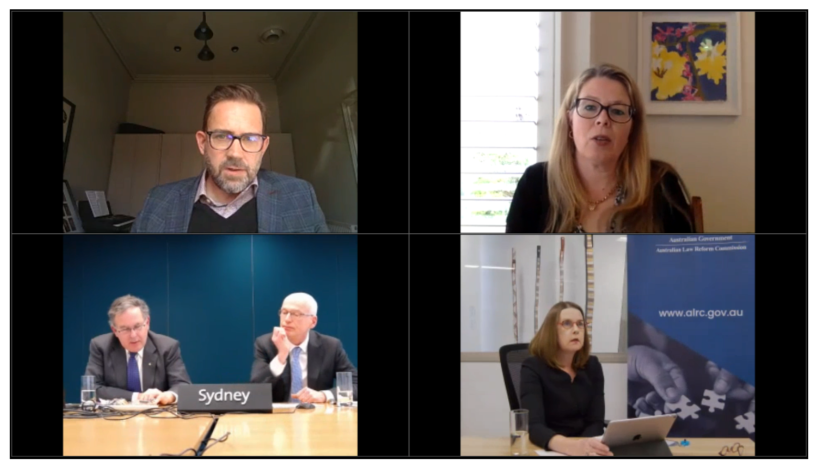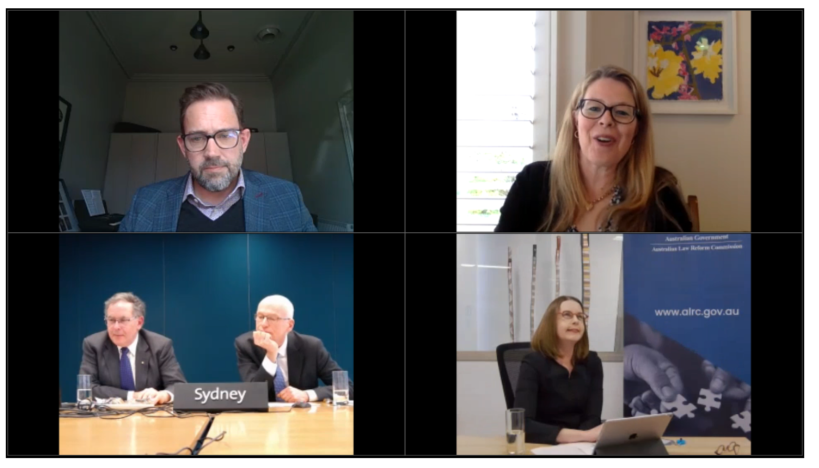31.08.2020
On Monday 17 August 2020 the Australian Law Reform Commission co-hosted with the University of Melbourne a webinar with a panel of experts discussing the potential for a future ALRC inquiry into legal structures for social enterprises. Almost 200 people viewed the event “live” and many more have registered to view the recording at a later time. Wolters Kluwer CCH Learning facilitated the live streaming of the event, and so enabled a nationwide, interactive conversation.
Professor Pip Nicholson, Dean of the University of Melbourne Law School, welcomed participants and observed that the Covid-19 pandemic has led many to re-think the distinction between purpose and profit, highlighting the relevance of issues relating to social enterprise.
Justice Sarah Derrington, President of the Australian Law Reform Commission, noted it was almost exactly 50 years since Milton Friedman had published an article declaring that “the social responsibility of business is to increase its profits”, and invited the panel to consider whether our current laws adequately provide for the pursuit of other purposes by social enterprises.
Professor Matthew Harding, Deputy Dean of the University of Melbourne Law School, described issues facing social enterprises as “fertile soil for an ALRC inquiry”. He noted that different issues may face “for profit” businesses wishing to pursue other purposes, and “not for profit” charities seeking to support their activities by running profitable businesses or raising capital. Focusing on the issue of when it is appropriate to restrain an organisation from distributing profits to investors, he highlighted the need to assess policy considerations such as “signalling”, and issues of organisational purpose, which are broader than the issue of corporate structure.
Associate Professor Rosemary Langford, also from Melbourne Law School, noted a number of recent overseas developments in this field that could be assessed in an ALRC inquiry. She described Australian law as being “revitalised” without the need for legislative change, as a wide range of business purposes can be accommodated in a company’s constitution, and can fit within fiduciary understandings of governance and accountability. She suggested that broader issues relating to corporate purpose, such as directors’ duties, standing, and enforcement, could helpfully form part of a deeper review of Australian corporate regulation.
Michael Ryland from the Centre for Social Finance Law observed that there are a number of corporate structures being used by social enterprises in Australia, but none of those structures were designed with social purpose in mind. Accordingly, lawyers have developed “work-arounds” for social enterprises that often require bespoke legal advice. He identified a number of legal questions that an inquiry could tackle, including ways of embedding purpose into a legal structure; risks facing directors when prioritising social purposes; appropriate reporting and licensing requirements; how to evaluate social outcomes; and who (beyond shareholders) should have the right to enforce social purpose undertakings.
Trevor Danos AM, an experienced lawyer and strategic advisor, emphasised that any new legal structure could not hope to resolve all problems experienced by social enterprise. Rather, in his experience, the social enterprise sector would seek to prioritise: the availability of grant funding; requirements for governments to increase procurement from social enterprises; more templates and off-the-shelf tools; a national accreditation and regulation framework; and low-cost professional advice (not just legal advice).
Andrew Davies, CEO of B Lab, described a significant cultural shift in recent years towards “stakeholder capitalism”, modifying the historically dominant focus on return for shareholders. B Lab advocates globally for the creation of benefit corporations as a legal status “to lock in mission and facilitate stakeholder governance practices”. However, B Lab is now not pursuing that kind of reform in Australia due to what it sees as an evolution in the interpretation of directors’ duties, including an increased focus on “non-financial risks” by regulators, investors, and corporations themselves. He suggested a broad inquiry into evolving business models and practices, and the role of corporate constitutions, could help clarify whether existing legal structures are indeed adequate, or whether there is a need for any legal reform.
A number of questions from the participants were put to the panel, and discussion points included:
- the relationship between the social enterprise sector and broader questions of social purpose in business;
- the accessibility of laws regulating social enterprise;
- difficulties incorporating a purpose-oriented organisation, and ways of streamlining the process, including published templates;
- the futility of attempting to fit all social enterprises into a “one size fits all” legal model;
- which regulator would oversee any new social enterprise regime;
- difficulties in defining key concepts such as “public benefit” and “private benefit”;
- the importance of transparency in stating an organisation’s purposes, and then measuring its performance against those purposes;
- the importance and difficulty of interpreting an organisation’s practice, as well as its form, in determining its underlying purposes;
- options regarding appropriate tax treatment of social enterprises;
- whether introducing a benefit corporation model could effectively reinforce a focus on the primacy of shareholder interests; and
- related developments in Social Impact Bonds, Social Benefit Bonds, and the work of the Social Impact Investment Taskforce.
Further comments on the need for an inquiry into this topic and other suggested topics closed on 31 August 2020.
View the recording of the Social Enterprises webinar.
View the recordings from the webinar series:


